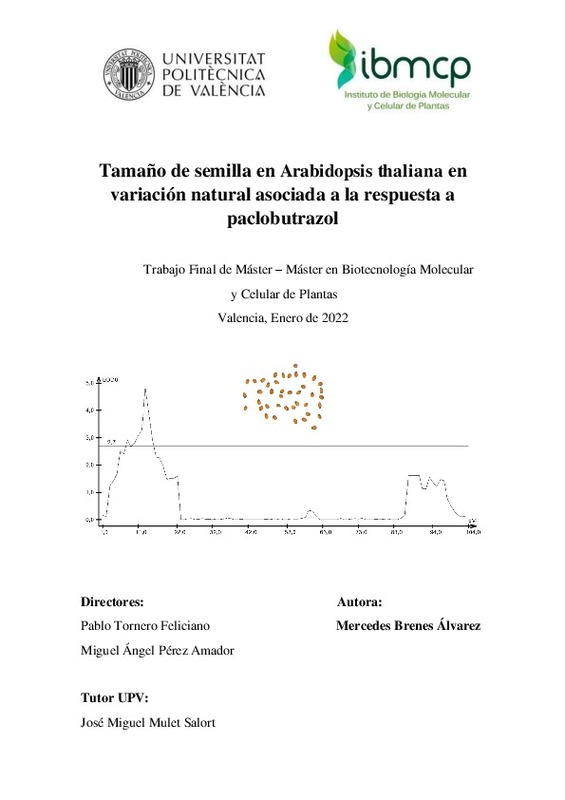|
[ES] La planta Arabidopsis thaliana tiene diversos ecotipos donde Col-0 y Laer destacan como los más utilizados. El tamaño de semilla de ambos ecotipos presenta valores similares en condiciones normales. Sin embargo, se ...[+]
[ES] La planta Arabidopsis thaliana tiene diversos ecotipos donde Col-0 y Laer destacan como los más utilizados. El tamaño de semilla de ambos ecotipos presenta valores similares en condiciones normales. Sin embargo, se produce una diferencia de tamaño al tratar con Paclobutrazol. Este compuesto inhibe la síntesis de giberelinas, hormonas vegetales implicadas en múltiples procesos de desarrollo de las plantas. Las giberelinas median su acción a través de la degradación de las proteínas DELLA, que son reguladores negativos de estas hormonas. Los tratamientos con paclobutrazol disminuyen los niveles de giberelinas estabilizando a las proteínas DELLA. Estudios previos muestran la implicación negativa de las giberelinas en el tamaño de las semillas, ya que mutantes deficientes DELLA exhiben un tamaño de semilla menor, mientras que el tratamiento con paclobutrazol o mutantes de ganancia de función DELLA provocan un aumento del tamaño de semilla. El objetivo del proyecto es la identificación del gen o genes responsables de la determinación del tamaño de semilla en presencia de PCB. La búsqueda de los genes se realiza aprovechando la variación natural existente entre los ecotipos Col-0 y Laer para el tamaño de semilla. Esto permite el uso de análisis de locus de caracteres cuantitativos (QTLs) para identificar regiones del genoma de A. thaliana responsables de la variación del tamaño y posteriormente reducirlas hasta un número limitado de genes.
El estudio de QTL permite identificar genes en el cromosoma uno y dos de A. thaliana como posibles responsables en la determinación del tamaño de semilla. Destacan genes relacionados con las giberelinas como GAI y GA3OX1 o genes relacionados con el desarrollo de las semillas como MFT. El gen más interesante es TWN2, implicado en proliferación celular y desarrollo de embriones.
[-]
[EN] EN] The Arabidopsis thaliana plant has several ecotypes where Col-0 and Laer stand out as the most used. The seed size of both ecotypes presents similar values under normal conditions. However, a size difference ...[+]
[EN] EN] The Arabidopsis thaliana plant has several ecotypes where Col-0 and Laer stand out as the most used. The seed size of both ecotypes presents similar values under normal conditions. However, a size difference occurs when treating with Paclobutrazol. This compound inhibits the synthesis of gibberellins, plant hormones involved in multiple plant development processes. Gibberellins mediate their action through the degradation of DELLA proteins, which are negative regulators of these hormones. Paclobutrazol treatments decrease gibberellins levels by stabilizing DELLA proteins. Previous studies show the negative implication of gibberellins in seed size, since DELLA deficient mutants exhibit a smaller seed size, while treatment with paclobutrazol or DELLA gain-of-function mutants cause an increase in seed size. The objective of the project is the identification of the gene or genes responsible for determining seed size in the presence of PCBs. The search for genes is carried out taking advantage of the natural variation that exists between the Col-0 and Laer ecotypes for seed size. This allows the use of quantitative trait locus (QTL) analysis to identify regions of the A. thaliana genome responsible for size variation and subsequently narrow them down to a limited number of genes. The QTL study allows the identification of genes on chromosome one and two of A. thaliana as possible responsible for determining seed size. Genes related to gibberellins such as GAI and GA3OX1 or genes related to seed development such as MFT stand out. The most interesting gene is TWN2, involved in cell proliferation and embryo development.
[-]
|







